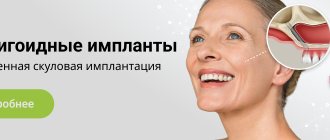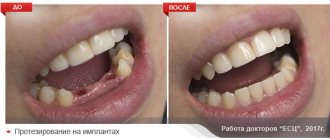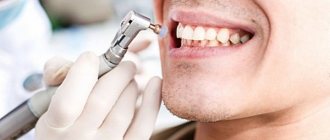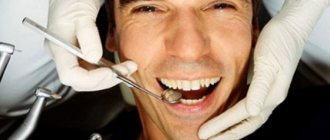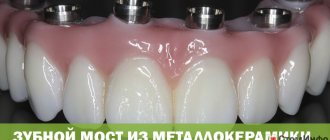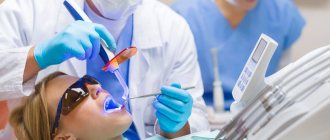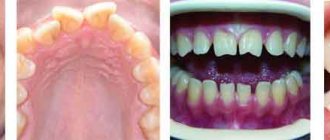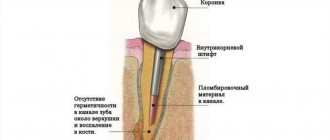After the patient’s body has received a stressful shock, tissue healing takes longer, and the risk of complications is much higher. Therefore, those who are terrified of surgical interventions, who ignore going to the doctor even if they have severe toothache, are offered modern alternative methods - treatment under general anesthesia or sedation.
Indications
- panic fear of dental treatment or surgical operations,
- low pain threshold,
- increased gag reflex,
- the need to install a large number of implants or the duration of surgery,
- inability to use local anesthesia,
- “special” patients, for example, with psychological or neurological problems.
Advantages
- painless installation of any number of implants,
- the ability to treat teeth and correct all anomalies of the dental system at one time,
- reducing the risk of developing postoperative complications,
- The implant surgeon focuses solely on the operation, without being distracted by the patient’s emotions.
Is general anesthesia safe for dental treatment?
Reviews about dental treatment under general anesthesia from medical professionals indicate that the use of medicinal sleep in dentistry is safe for the health of patients, the main thing is that certain requirements are met, and in addition, the dosage of the anesthetic drug is selected correctly.
The dosage of an anesthetic drug during dental treatment under anesthesia is selected taking into account the following factors:
- General health of the patient;
- The weight of the person who will undergo dental treatment under anesthesia;
- Duration of treatment measures.
A person who wants to undergo dental treatment under anesthesia must undergo a general medical examination of the body and take a number of different tests in order to reduce the risk of possible complications and negative health consequences.
GOOD TO KNOW: When treating teeth under general anesthesia, the doctor may administer an additional dose of drugs if necessary. In addition, although the procedure is generally considered safe for patients, it should not be used too often!
Indications and contraindications for dental treatment under general anesthesia
There are both indications and contraindications for dental treatment under general anesthesia. It will also be useful to know all the details about them before you decide to use such a dental service.
Indications for dental treatment under anesthesia include:
- Extreme fear of dental treatment. The patient's panicky state can interfere with high-quality and effective dental treatment;
- Abnormally low pain threshold;
- High gag reflex;
- The need for dental implantation during which the patient will have to implant more than 4 artificial roots - implants;
- Dental treatment under anesthesia is indicated for patients with an allergic reaction to local anesthetic drugs;
- If you need to treat multiple caries or pulpitis in one visit.
dental treatment under general anesthesia is mainly used patients. It is less commonly used in pediatric dentistry.
Dental treatment under general anesthesia also has contraindications:
- It is not applicable in patients with lung diseases, certain diseases of the respiratory system, or heart;
- Dental treatment is not carried out in case of malfunctions of the endocrine system, diabetes mellitus, kidney and liver pathologies;
- You will have to refuse dental treatment under anesthesia if your immune system is poor or if you have infectious diseases.
The temporary limitation for dental treatment under anesthesia is pregnancy.
Concept of general anesthesia
General anesthesia also involves the professional actions of an anesthesiologist aimed at artificially introducing the patient into a state of deep sleep with the help of potent drugs used only in anesthesiology. At the same time, the activity of the central nervous system is reduced as much as possible, which is accompanied by a complete absence of pain, any reaction to irritating factors and partial elimination of reflexes. It could be a narcotic drug.
No matter how sad it may sound, at present, general anesthesia with mandatory hospitalization is now mainly carried out only in public clinics, motivated to retain the patient for several days to simulate statistics with a huge hospital load on “bed-days” and the formation of a bonus fund doctors, as these are the rules now.
However, time does not stand still and now a modern operating room in a specialized non-state dental clinic, which involves the use of general anesthesia in its work, is always provided with the following medical attributes:
- artificial lung ventilation device;
- availability of centralized oxygen supply;
- laryngoscopes, blades of various sizes and endotracheal tubes of all sizes;
- monitors for continuous monitoring of all vital signs, that is, blood pressure, heart rate and blood oxygen saturation (saturation);
- subclavian catheters and related accessories;
- defibrillator and never need it again;
- drugs to provide emergency assistance in the event of any acute situations, which is more likely during general anesthesia (adrenaline, atropine, refortan, stabizol, dopamine, mezaton);
- medical equipment that ensures comfortable work for the anesthesiologist (manipulation table, fluorescent lamp, infusion pump, disposable consumables, intravenous catheters, disposable systems in sufficient quantities).
Advantages of using general anesthesia for dental treatment
What benefits can you get by using the service of dental treatment under anesthesia in Moscow? There are quite a lot of them:
- Dental treatment under anesthesia takes place without pain, without psychological discomfort and emotional stress;
- It becomes possible to carry out complex or lengthy dental treatment in the shortest possible time;
When treating teeth under anesthesia, the doctor fully concentrates on his work, is not distracted by the patient’s reactions, and this has a positive effect on the quality of the procedures performed.
The concentration and focus of a specialist are especially important when performing complex operations such as implantation, tooth extraction, and dental prosthetics.
USEFUL TO KNOW: Dental treatment under anesthesia also helps in endodontic treatment - treatment of tooth canals. This is a rather uncomfortable procedure for the patient, but it cannot be avoided if you need to cure pulpitis or periodontitis. Rushing to treat canals can result in the cavities being insufficiently cleaned or, even worse, a piece of dental instrument remaining in the canal. Such errors in the treatment of canals cause a relapse of the inflammatory process!
All these advantages of dental treatment under general anesthesia in their reviews not only by professional dentists, but also by patients who have already undergone the procedure.
How is the prosthetic procedure performed?
Types of prosthetics
There are two main types of dental prosthetics – removable and fixed. Fixed dentures are single crowns or bridges fixed to supporting elements (teeth, tooth roots or dental implants) that are worn for several years.
The most common type of fixed prosthetics is prosthetics using metal-ceramic structures. But there are more modern methods of prosthetics based on a material such as zirconium dioxide, which is hypoallergenic and completely biocompatible. The structure of the material allows you to achieve the most aesthetically attractive appearance of ceramic restoration. First of all, this is relevant for the teeth of the anterior group.
Veneers are also used in aesthetic prosthetics. These are fairly thin ceramic overlays that cover the front part of the tooth after fine grinding of the enamel.
Removable dentures are installed in the absence of teeth or the absence of a large number of them: they can be either complete or partial.
The most economical option is a plastic prosthesis: a plastic base that follows the contours of the mucous membrane, on which plastic teeth and clasps (hooks for fixation) are located. There are also flexible or nylon prostheses that have a sufficient number of contraindications.
If you focus on a higher degree of comfort, then the best option is dental prosthetics using clasp dentures - a thin metal structure in the shape of an arc made of a cobalt-chromium alloy. Plastic in such a prosthesis is present only in the area of missing teeth. Fastening can be carried out either using clasps or locks.
When a person has six or more natural teeth left, a competitive solution with implantation will be micro-locking prosthetics: the tooth is processed, a metal-ceramic crown with locks is put on it, and the mating part of the lock is placed on a removable clasp denture.
Are there risks of complications after dental treatment under anesthesia?
The mechanism of action on the body of anesthetic drugs that are used in general anesthesia has not yet been fully studied by science. Therefore, the risks of some side effects after dental treatment under anesthesia cannot be completely excluded. These risks persist even if the person is absolutely healthy and all examinations have not revealed any contraindications to dental treatment under anesthesia. These risks must be taken into account when choosing a clinic.
Dental treatment under anesthesia is not carried out free of charge, and dentistry that offers this service to patients must not only employ a qualified anesthesiologist and resuscitator, but also must have the appropriate equipment.
Resuscitation devices, devices for monitoring absolutely all human vital systems, medications necessary for emergency cases.
Are there alternatives to dental treatment under general anesthesia?
Of course, modern dentistry is ready to offer patients alternatives to dental treatment under anesthesia. First of all, this is local anesthesia, secondly, dental treatment while sleeping, under sedation. Sedation is a light medicated sleep in which the patient does not feel pain, but is not unconscious, he can even respond to the dentist’s requests and carry them out.
Dental treatment under anesthesia is indicated mainly when the patient has a strong panic fear of dentists, when performing complex types of surgical interventions.
If you just have to cure caries, but you still can’t cope with your anxiety, tell your doctor about it. The specialist can premedicate you with a sedative, which will remove unnecessary anxiety before treatment. Which option to choose for truly painless dental treatment? This issue should also be discussed with your doctor.
Contraindications
Immersion in medicated sleep involves the use of safe means. But a number of restrictions on use are always present:
- Severe brain or spinal cord injuries
- Acute circulatory disorders
- Bronchial asthma, pneumonia in the stage of active inflammation
- Period of exacerbation of chronic diseases with increased temperature
- Decompensated cardiovascular diseases
- Alcoholism, drug addiction, withdrawal symptoms
- Severe mental disorders, epilepsy
- Pregnancy and lactation
Prices for dental treatment under general anesthesia in Moscow
The price for dental treatment under anesthesia in Moscow will depend on what type of drug will be used and what specific operation will be performed on the patient. If a drug administered intravenously is used in dental treatment under anesthesia, the cost of anesthesia can range from 10,000 rubles. Anesthesia using the mask method will cost more - from 15,000 rubles per hour of medicated sleep.
exact price of dental treatment under anesthesia during a consultation with a doctor at our dental clinic in Moscow - “Firadent”. We offer our patients the service of dental treatment under anesthesia - for this, our clinic has the necessary equipment and employs competent specialists - an anesthesiologist and resuscitator.
Dentistry "Firadent" - all conditions for safe, painless and high-quality dental treatment of any complexity!
